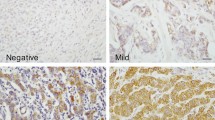Abstract
Background
Fatty acid oxidation (FAO) is a major energy-generating process in the mitochondria and supports proliferation, growth, and survival of cancer cells. l-Carnitine is an essential co-factor for carrying long-chain fatty acids into the mitochondria. The entry of l-carnitine across cell membrane is regulated by OCTN2 (SLC22A5). Thus, it can plays a significant role in the mitochondrial fatty acid oxidation. This study aimed to evaluate the OCTN2 expression and its association with clinicopathological characteristics in breast cancer.
Methods
In this work, OCTN2 was examined in 54 pairs of fresh samples of breast cancer (BC) and adjacent noncancerous tissue using quantitative real-time polymerase chain reaction and immunohistochemistry (IHC). The IHC approach was also used to investigate the expression of additional clinicopathological features.
Results
The present research findings revealed that the relative expression of OCTN2 in BC tissues was substantially higher than the adjacent normal tissues. This up-regulation was correlated positively with tumor size and Ki-67 and negatively with the progesterone receptor (PR) status, providing evidence of the opposite effects of OCTN2 and PR on tumor development.
Conclusion
The study shows that the OCTN2 expression in BC patients may be used as a prognostic biomarker and a tumor oncogene. As a result, it could be considered a possible therapeutic target. Nevertheless, the significance of the findings needs to be confirmed by further studies.


Similar content being viewed by others
References
Dinarvand N et al (2020) Expression and clinicopathological significance of lipin-1 in human breast cancer and its association with p53 tumor suppressor gene. J Cell Physiol 235(7–8):5835–5846
Longo N, Amat di San Filippo C, Pasquali M (2006) Disorders of carnitine transport and the carnitine cycle. Am J Med Genet Part C
Console L et al (2020) Carnitine traffic in cells. Link with cancer. Front Cell and Dev Biol 981
Wang D et al (2017) ATP citrate lyase is increased in human breast cancer, depletion of which promotes apoptosis. Tumor Biol 39(4):1010428317698338
Carracedo A, Cantley LC, Pandolfi PP (2013) Cancer metabolism: fatty acid oxidation in the limelight. Nat Rev Cancer 13(4):227–232
Juraszek B, Czarnecka-Herok J, Nałęcz KA (2021) Glioma cells survival depends both on fatty acid oxidation and on functional carnitine transport by SLC22A5. J Neurochem 156(5):642–657
Longo N, Frigeni M, Pasquali M (2016) Carnitine transport and fatty acid oxidation. Biochimica et Biophysica Acta 1863(10):2422–2435
Juraszek B, Nałęcz KA (2019) SLC22A5 (OCTN2) carnitine transporter—indispensable for cell metabolism, a Jekyll and Hyde of human cancer. Molecules 25(1):14
Wu Y et al (2015) Carnitine transporter CT2 (SLC22A16) is over-expressed in acute myeloid leukemia (AML) and target knockdown reduces growth and viability of AML cells. Apoptosis 20(8):1099–1108
Cutler MJ, Choo EF (2011) Overview of SLC22A and SLCO families of drug uptake transporters in the context of cancer treatments. Curr Drug Metab 12(8):793–807
Ottria A et al (2020) Fatty acid and carnitine metabolism are dysregulated in systemic sclerosis patients. Front Immunol 11:822
Scalise M et al (2012) Human OCTN2 (SLC22A5) is down-regulated in virus-and nonvirus-mediated cancer. Cell Biochem Funct 30(5):419–425
Wang C et al (2012) SLC22A5/OCTN2 expression in breast cancer is induced by estrogen via a novel intronic estrogen-response element (ERE). Breast Cancer Res Treat 134(1):101–115
Sun D et al (2021) The role of the carnitine/organic cation transporter novel 2 in the clinical outcome of patients with locally advanced esophageal carcinoma treated with oxaliplatin. Front Pharmacol 12
Jariwala N et al (2021) CPT1A and fatty acid β-oxidation are essential for tumor cell growth and survival in hormone receptor-positive breast cancer. NAR Cancer 3(3):zcab035
Dinarvand N et al (2020) Evaluation of long-chain acyl-coenzyme A synthetase 4 (ACSL4) expression in human breast cancer. Res Pharm Sci 15(1):48
Iqbal BM, Buch A (2016) Hormone receptor (ER, PR, HER2/neu) status and proliferation index marker (Ki-67) in breast cancers: their onco-pathological correlation, shortcomings and future trends. Med J Dr. DY Patil Univ 9(6):674
Dunnwald LK, Rossing MA, Li CI (2007) Hormone receptor status, tumor characteristics, and prognosis: a prospective cohort of breast cancer patients. Breast Cancer Res 9(1):1–10
Giannakeas V (2020) Single hormone receptor-positive breast cancer—signal or noise? JAMA Netw Open 3(1):e1918176–e1918176
Hishida M et al (2013) Estrogen receptor 1 gene as a tumor suppressor gene in hepatocellular carcinoma detected by triple-combination array analysis. Int J Oncol 43(1):88–94
Hashmi AA et al (2019) Ki67 index in intrinsic breast cancer subtypes and its association with prognostic parameters. BMC Res Notes 12(1):1–5
Fink MA et al (2019) L-carnitine–mediated tumor cell protection and poor patient survival associated with OCTN2 overexpression in glioblastoma multiformeOCTN2/LC system in GBM: cell protection and prognostic value. Clin Cancer Res 25(9):2874–2886
Funding
This work was financially supported by Isfahan University of Medical Sciences, I.R. Iran (Grant No. 396510) and Dezful University of Medical Sciences, I.R. Iran (Grant No. IR.DUMS.REC.1396.35).
Author information
Authors and Affiliations
Contributions
MP and ND designed the experiments. ND performed experiments and analyzed the data. FK, RA, SR, and AS assisted with experimental design and data analysis. The paper was written by MP and ND. All authors read and approved the final manuscript.
Corresponding author
Ethics declarations
Competing Interests
The authors declare no conflict of interest for this study.
Ethical approval
This study was approved by the Isfahan University of Medical Sciences Ethics Committee in accordance with Code of Ethics 396510.
Consent to participate
Informed consent was obtained from all individual participants included in the study.
Additional information
Publisher's Note
Springer Nature remains neutral with regard to jurisdictional claims in published maps and institutional affiliations.
Rights and permissions
Springer Nature or its licensor (e.g. a society or other partner) holds exclusive rights to this article under a publishing agreement with the author(s) or other rightsholder(s); author self-archiving of the accepted manuscript version of this article is solely governed by the terms of such publishing agreement and applicable law.
About this article
Cite this article
dinarvand, N., Karimi, F., Azizi, R. et al. Evaluation of the gene encoding carnitine transporter (OCTN2/SLC22A5) expression in human breast cancer and its association with clinicopathological characteristics. Mol Biol Rep 50, 2061–2066 (2023). https://doi.org/10.1007/s11033-022-08152-z
Received:
Accepted:
Published:
Issue Date:
DOI: https://doi.org/10.1007/s11033-022-08152-z




